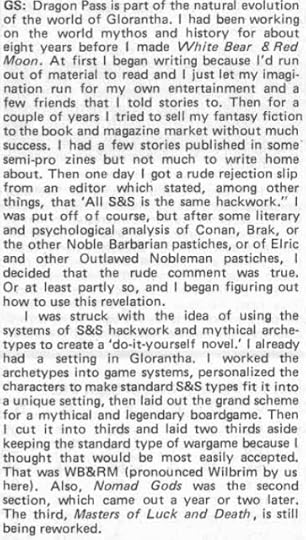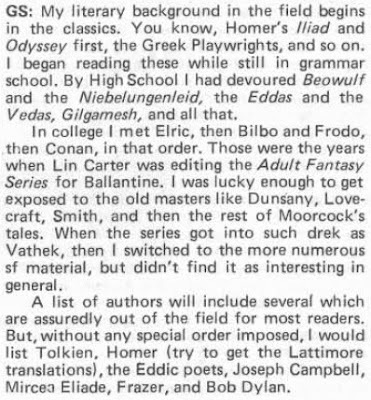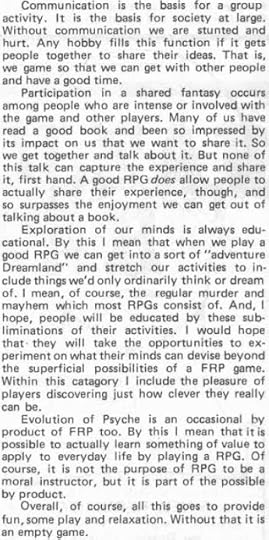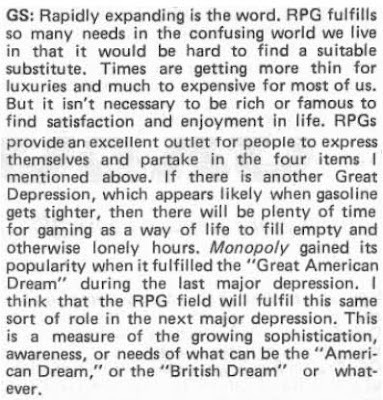White Dwarf Interviews Greg Stafford

As I mentioned in my recent post about issue #17 of White Dwarf, the issue contains a fascinating interview with Greg Stafford, creator of the fantasy setting of Glorantha and a founder of Chaosium. The interview was apparently conducted at GenCon XII (1979) by Ian Livingstone and covers a wide range of topics, with special attention paid to Stafford's thoughts about Glorantha, RuneQuest, and roleplaying in general. From the vantage point of 2021, I find the interview remarkable, not just for the topics it covers but for the answers Stafford gives, some of which are truly unique.
Livingstone begins by asking about the origins of Glorantha – or "the world of Dragon Pass," as he calls it throughout the interview – and Stafford replies at length:

There's a lot to unpack here, starting with the fact that Glorantha begin, much like M.A.R. Barker's Tékumel, as something Stafford created "for [his] own entertainment." More interesting is his partial agreement with the rude editor who claimed that "All S&S is the same hackwork." I hear variations of this claim a lot, particularly from those who dislike this blog's focus on the pulp fantasy antecedents of D&D and other early RPGs. Consequently, I was initially taken aback by Stafford's seeming acceptance of it, if only partially. However, as he seems to suggest in the second paragraph of his response, he recognizes the value of "standard S&S types."
Stafford explains a bit about his own literary education, including the authors and stories that most influenced him.
 None of what he says here surprises me, though why he singles out Vathek for opprobrium I can't be sure. More notable, I think, is that Stafford elevates Joseph Campbell, Mircea Eliade, Sir James Frazer, and Bob Dylan(!) to the same level as Tolkien and Homer in terms of influence upon him. That says a great deal about what Stafford hoped to achieve through the development of Glorantha. It also explains why I was frequently told, in my early days, that RuneQuest was "a hippy game" to be avoided by good East Coast boys like myself.
None of what he says here surprises me, though why he singles out Vathek for opprobrium I can't be sure. More notable, I think, is that Stafford elevates Joseph Campbell, Mircea Eliade, Sir James Frazer, and Bob Dylan(!) to the same level as Tolkien and Homer in terms of influence upon him. That says a great deal about what Stafford hoped to achieve through the development of Glorantha. It also explains why I was frequently told, in my early days, that RuneQuest was "a hippy game" to be avoided by good East Coast boys like myself.Interesting though all this is, the real meat of the interview comes when Livingstone asks Stafford about his thoughts on the popularity of RPGs. Stafford replies that he believes this popularity rests on four elements: "1. Communication with others; 2. Participation in a shared fantasy; 3. Exploration of our minds; 4. Exploration of the psyche." He expands upon each of these shortly thereafter:
 A whole series of posts could no doubt be written teasing out the implications of everything Stafford says here. Perhaps one day I'll do just that. For the moment, though, I think it suffices to say that Stafford definitely has some genuine insight here into the appeal of roleplaying games. In particular, I think his comments about "shared fantasy" are spot on, at least as far as my own feelings are concerned.
A whole series of posts could no doubt be written teasing out the implications of everything Stafford says here. Perhaps one day I'll do just that. For the moment, though, I think it suffices to say that Stafford definitely has some genuine insight here into the appeal of roleplaying games. In particular, I think his comments about "shared fantasy" are spot on, at least as far as my own feelings are concerned. Later, Stafford returns to some of these same topics, when he offers his opinions on the future of the RPG hobby and what purposes roleplaying games might serve in the future.
 I remember the late 1970s quite well; there was definitely a pessimism about the future in the air, much as there is in many quarters nowadays. That Stafford saw RPGs as a lifeline in difficult times is worth bearing in mind, regardless of whether one shares his gloominess. I can certainly say that I greatly value the games I play each week with my friends across the globe. The connection they provided during the last couple of years has been vital and I doubt I am alone in feeling that.
I remember the late 1970s quite well; there was definitely a pessimism about the future in the air, much as there is in many quarters nowadays. That Stafford saw RPGs as a lifeline in difficult times is worth bearing in mind, regardless of whether one shares his gloominess. I can certainly say that I greatly value the games I play each week with my friends across the globe. The connection they provided during the last couple of years has been vital and I doubt I am alone in feeling that.
James Maliszewski's Blog
- James Maliszewski's profile
- 3 followers



